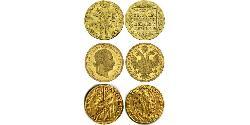1 Ducat (Vendue pour $400.0)
1848, Austria/Romania, Ferdinand I. Gold Ducat Coin. Karlsburg, Transylvania!
Mint Year: 1848 Denomination: Gold Ducat Reference: Friedberg 481, KM-2262. Mint place: Karlsburg, Transylvania (E) Condition: Cleaned, scratches and digs, possibly removed from jewellery, otherwise about XF! Material: Gold (.986) Diameter: 20mm Weight: 3.44gm
Obverse: Laureate head of Ferdinand right. Mint initial (E) of Karlsburg below. Legend: FERD . I . D . G . AVSTR . IMP . HVG . BOH . R . H . N . V . / E Reverse: Imperial double headed weagle with coat of arms at chest and crown above. Legend: GAL . LOD . ILL . A . A . 1848 . REX . LOMB . ET . VEN . DALM .
The Principality of Transylvania, from 1765 the Grand Principality of Transylvania, was a realm of the Hungarian Crown and from 1804 an Austrian crownland ruled by the Habsburg and Habsburg-Lorraine monarchs of the Habsburg Monarchy (later Austrian Empire). During the Hungarian Revolution of 1848, the Hungarian government proclaimed union with Transylvania in the April Laws of 1848 (after the Transylvanian Diet's confirmation on 30 May and the king's approval on 10 June that Transylvania again become an integral part of Hungary). After the failure of the revolution, the March Constitution of Austria decreed that the Principality of Transylvania be a separate crown land entirely independent of Hungary. In 1867, as a result of the Austro-Hungarian Compromise, the principality was reunited with Hungary proper.
Ferdinand I, Emperor of Austria, King of Hungary and Bohemia (April 19, 1793 – June 29, 1875) succeeded his father (Franz II Holy Roman Emperor/Franz I of Austria) as emperor and king (as Ferdinand V) in 1835. He chose to abdicate, after a series of revolts in 1848. He was also King of Lombardy-Venetia.
Ferdinand has been depicted as feeble-minded and incapable of ruling, but although he was epileptic and certainly not intelligent, he kept a coherent and legible diary and has even been said to have a sharp wit. The up to twenty seizures he had per day, though, severely restricted his ability to rule with any effectiveness.
Though he was not declared incapacitated, a regent's council (Archduke Luis, Count Kolowrat and Prince Metternich) steered the government. His marriage to Princess Maria Anna of Sardinia (1803-1884) was probably never consummated, nor is he believed to have had any other liaisons. He is famous for his one coherent command: when his cook told him he could not have apricot dumplings because they were out of season, he said "I'm the Emperor, and I want dumplings!" (German: Ich bin der Kaiser und ich will Knödel.)
As the revolutionaries of 1848 were marching on the palace, he is supposed to have asked Metternich for an explanation. When Metternich answered that they were making a revolution, Ferdinand is supposed to have said "But are they allowed to do that?" (Viennese German: Ja, dürfen's denn des?) He was convinced by Felix zu Schwarzenberg to abdicate in favour of his nephew, Franz Joseph (the next in line was Ferdinand's younger brother Franz Karl, but he was persuaded to waive his succession rights in favour of his son) who would occupy the Austrian throne for the next sixty-eight years.
Ferdinand recorded the events in his diary : "The affair ended with the new Emperor kneeling before his old Emperor and Lord, that is to say, me, and asking for a blessing, which I gave him, laying both hands on his head and making the sign of the Holy Cross ... then I embraced him and kissed our new master, and then we went to our room. Afterward I and my dear wife heard Holy Mass ... After that I and my dear wife packed our bags"
Ferdinand was the last King of Bohemia to be crowned as such. Due to his sympathy with Bohemia (where he spent the rest of his life in Prague Castle) he was given the Czech nickname "Ferdinand V, the Good" (Ferdinand Dobrotivý). In Austria, Ferdinand was similarly nicknamed "Ferdinand der Gütige" (Ferdinand the Benign), but also ridiculed as "Gütinand der Fertige" (Goodinand the Finished).
He is interred in tomb number 62 in the Imperial Crypt in Vienna.

spa1 » Various Ducats (23 pièces)
The first issue of this coin is thought to have been under Roger II of Sicily, who, in 1140, coined ducats bearing the figure of Christ, and the inscription, ‘Sit tibi, Christe, datus, quem tu regis iste ducatus’ (or roughly, “O Christ, let this ...

|
Posté par:
anonymous 2020-11-27 |
|
||
|
||
|
||
|
||
|
||

-600-300-XoTDyKwrZFQAAAF26EeESwhP.jpg)

-300-150-Fe0Kbzbi0tIAAAFGGr0OlZ5R.jpg)
 Deutsch
Deutsch Русский
Русский Українська
Українська English
English Italiano
Italiano Français
Français Español
Español 汉语
汉语












